#she is literally Dionysos
Text
if you could pick one fictional character to explain a Deity to someone who is unfamiliar with Them, who would it be ?
#me looking at Mama Odie from Princess and the Frog#she is literally Dionysos#theoi#greek gods#hellenic polytheist#helpol#hellenic paganism#kemeticism#heathenry#polytheism#paganism#religion#norse deities#hindu deities#egyptian deities#gods and deities
14 notes
·
View notes
Text
I finished ToA not long ago and I wanted to write down some thoughts/scenes that stick with me
(in chronological (ish) order, watch out for spoilers)
Theres an italian girl at camp ! It means Nico gets to practice and speak italian ! (which probably haven't happened in about 70 years)
Will introducing Nico as "my boyfriend". I already knew they would be canon, but reading that line felt weird /pos
Apollo sees Solangelo and think of himself and Hyacinth
That night when Kayla and Austin disappeared and Apollo left to look for them, it probably was the first night Will ever spent alone in his cabin
Apollo's insane body dysmorphia. He's a god, he can always take the physical form he is the most comfortable and confident in... Until now. He is stuck in a body that isn't his, he feels ashamed, when he sees certain traits in others he find them charming or pretty, but when it's on him then it's disgusting. He complain that everything is this body's fault (ex. he wouldn't have been touched by the Eurynomos if it wasn't for his chub.)(I could go on for hours)
Lityerses ! I love that guy. Idk why i love him that much. He is my best guy.
Apollo's reaction to Commodus' name. His flashback of him. So painful he was physically sick.
Apollo talking Helios out of killing them, because he just want to be free, not to hurt them.
APOLLO ATTEMPT TO KHS TO STOP THEM ?? IM A SUCKER FOR SOME GOOD PAINFUL SELF SACRIFICE.
Jason. I'm not talking about Jason. I can't speak about Jason.
Frank and Apollo ! They are so fond of each other !!!
Apollo heard all of Frank's prayers when he was unclaimed and wished he could've adopted him.
And Frank respecting Apollo as a god although he is *vaguely gesture at Apollo/Lester*
Reyna saying aloud that she doesn't want nor needs romance. It's so rare to see aromantic representation and Rick did it so well.
Literally Apollo singing his way out of situations.
FRANK'S SELF SACRIFICE!!! (He already had one of my favorite character development before that)
APOLLO KILLING COMMODUS ??? why do never talk about that it's one of the best deaths I've ever seen that was BADASS AND FULL OF EMOTIONS.
Apollo slowly dying out of poison and the Dodona Arrow doing everything it can to keep him conscious.
I hope Dakota didn't get killed off just to give Lavinia the role of Centurion. I love my boy Dakota, and his death felt kind of meaningless, except for her rank up :/ also i feel like it doesn't suit Lavinia. Some ppl are strong and good and trustable but just not made to order others. (ill prop make a full post about that)
Dionysos confirmed to be an annoying little brother!
Nico. How does Rick manage to always give him more issues. Leave the kid alone.
When Will glows, Apollo is genuinely impressed and tells him how proud he is.
Nico destroying Nero's door with his giant zombie bull. That was cool.
When Apollo gets stabbed in Nero's tower and think it's the end, he prays "Zeus, Artemis, Leto, anyone"
And in general the few parts he talks about Leto, he's such a momma's boy and I love it.
When Apollo left for Delphi... I was fully expecting Meg to go with him. I was so worried that he went alone while already feeling that weakened from the previous events.
DODONA ARROW. FOREVER IN MY HEART.
Artemis is here when Apollo wakes up. She's by his side, she's the first person to tell him he succeeded, she hold him while he sobs...
The first thing he does is to greet his horses :) and then to see his friends.
When he gets back to the Dodona bush ! To tell them all how brave and heroic the Arrow have been !
I could spend hours talking about the character developments of Apollo, Meg and the Dodona Arrow (i love the arrow so much you have no idea) but its for another day
There's many things I didn't talk about, but the post is already long enough. I love those 5 books, and Apollo is an amazing narrator.
I love the Arrow of Dodona with all my heart.
#when ill finish tsats ill maybe make the same kind of post#writing down all my most memorable thoughts#pjo#percy jackon and the olympians#heroes of olympus#hoo#nico di angelo#will solace#trials of apollo#apollo pjo#toa#meg mccaffrey#frank zhang
43 notes
·
View notes
Text
Dionysus Deity Guide
Content warning: Dionysus is linked heavily with sexuality and sexual themes will be prevalent throughout this post.

Who is Dionysus?
Also spelled “Dionysos”, he is the Greek god of wine, ecstasy, and theatre to name a few of his areas of expertise. He was later adopted by the Romans who referred to him as Bacchus. Dionysus was known as being “twice born” due to the story of his birth(s).
The story of Dionysus’ birth is a tragedy, beginning his life with his mother’s death. The story goes that Hera caught wind of Semele’s pregnancy with Zeus’ child and convinced her to ask Zeus to show her his true godly form in order to prove that he really was Zeus. This true form was too much for a mortal to handle and Semele was consumed by fire—or the heat Zeus’ lightning bolts. Not wanting his child to die with her, Zeus sewed Dionysus into his own thigh (thought to mean his testicles).
Parents and Siblings
Zeus (Father)
Semele (Mother)
Demeter (Mother, at times)
Persephone (Mother in Orphic mythos)
Siblings
Aeacus
Angelos
Apollo
Ares
Artemis
Athena
Eileithyia
Enyo
Eris
Ersa
Hebe
Helen of Troy
Hephaestus
Heracles
Hermes
Minos
Pandia
Persephone
Perseus
Rhadamanthus
Tantalus
the Graces
the Horae
the Litae
the Muses
the Moirai
Lovers or Partners
Ariadne (Wife/Consort)
Aphrodite
Aura
Beroe
Cronois
Nicaea
Althaea
Erigone
Pellene
Physcoa
Ampelus
Polymnus or Hyplipnus
Children
HYMENAIOS/Hymenaeus (Son)
IAKKHOS (Iacchus) (Son)
METHE (Daughter)
PASITHEA (Daughter)
PRIAPOS/Priapus (Son)
SABAZIOS/Sabazius (Son)
TELETE (Daughter)
THYSA (Daughter)
DEIANEIRA (Daughter)
EURYMEDON (Son)
KERAMOS/Ceramus (Son)
NARKAIOS/Narcaeus (Son)
OINOPION/Oenopion (Son)
PEPARETHOS/Peparethus (Son)
PHANOS (Son)
PHLIASOS or PHLIAS (Son)
STAPHYLOS/Staphylus (Son)
THOAS
Epithets
Note: Dionysus has many epithets and to create a list of all of them would make this post WAY too long so I’ve added as many as I could while retaining a good length for the post. :,>
Dionysus Eleutherios ("the liberator")
Acratophorus, Ἀκρατοφόρος ("giver of unmixed wine"), at Phigaleia in Arcadia
Acroreites at Sicyon
Androgynos Ἀνδρόγυνος (androgynous, specifically in intercourse) referring to the god taking both an active male and a passive female role.
Bassareus, Βασσαρεύς a Thracian name for Dionysus, which derives from bassaris or "fox-skin", which item was worn by his cultists in their mysteries.
Braetes, Βραίτης ("related to beer") at Thrace
Cistophorus Κιστοφόρος ("basket-bearer, ivy-bearer"), Alludes To baskets being sacred to the god.
Dimetor Διμήτωρ ("twice-born") Refers to Dionysus's two births.
Dendrites Δενδρίτης ("he of the trees"), as a fertility god.
Enorches ("with balls"), with reference to his fertility, or "in the testicles" in reference to Zeus' sewing the baby Dionysus "into his thigh", understood to mean his testicles). Used in Samos and Lesbos.
Iacchus, Ἴακχος a possible epithet of Dionysus, associated with the Eleusinian Mysteries. In Eleusis, he is known as a son of Zeus and Demeter. The name "Iacchus" may come from the Ιακχος (Iakchos), a hymn sung in honor of Dionysus.
Lenaius, Ληναῖος ("god of the wine-press")
Phleus ("related to the bloοm of a plant").
Pseudanor Ψευδάνωρ (literally "false man", referring to his feminine qualities), in Macedonia.
Tauros, Ταῦρος ("a bull"), occurs as a surname of Dionysus.
(Wiki)
Notes
Dionysus may have been worshipped as early as c. 1500–1100 BC by Mycenaean Greeks.
After birth Dionysus was said to have been sent to be cared for by Nymphs at Mount Nysa, the identities of these Nymphs varies by source.
His wife, Ariadne, was abandoned by Theseus on the island of Naxos. In some myths she is slain and/or ascends to immortality to live with her husband on Mt. Olympus.
Once he was an adult, Dionysus traveled to the underworld to bring his mother back with him to Olympus where it’s said that Zeus then turned her into the goddess Thyone—Goddess of the Bacchic frenzy that his female followers experience.
Dionysus is regularly found with groups of satyrs and maenads.
Another name the Greeks had for Dionysus was Bacchus, this was the name the Romans would later adopt for the god. Bacchus means “the noisy or riotous god”, fitting for this buck-wild deity! (Said with affection, of course.)
Along with wine, ecstasy, and theatre, Dionysus was known as a god of vegetation, madness, and frenzy along with quite a few other specializations.
Once a group of pirates kidnapped Dionysus who planned to sell him as a slave (or other unsavory things, depending on the myth); he overran their boat with creeping vines and beasts, and caused the men to go insane, then turned them into dolphins as they jumped overboard.
Dionysus has been depicted in many ways over time but two prevalent depictions are either him as an androgynous youth or an old, bearded man.
Apparently Dionysus hates owls; rather he hates the “sight of an owl” (Theoi)
As Bacchus he was commonly depicted as having ram or bull horns.
Dionysus had many cults throughout the ancient world including not just Greece, but in Scythia, Eastern Europe, Libya, North Africa and Gaul, Southern France as well.
Modern Deity Work
Correspondences
These are not all historically accurate. Anything that has a background in ancient tradition will be marked with a (T).
Rocks/Stone/Crystals
Grape Agate
Amethyst (it was believed that this stone could protect you from drunkenness)
Antimony
Gold
Garnet
Ruby
Herbs/Plants
Pinecone & Pine tree (due to his staff being tipped with a pinecone) (T)
Grapes/grapevines (T)
Ivy (T)
Asphodel (T)
Animals
Leopard or Panther
Tiger
Bull
Serpent
Dolphins (T)
Fawns (his followers were said to wear fawn-skins)
Important Dates
Dionysia
Haloa
Ascolia
Lenaia
Bacchanalia
Offerings
Wine (T)
Objects or imagery of the aforementioned items and animals
Fruit or fruit salad
Honey
Beer
Acts of Devotion
Go buck-wild (half joking here)
Dance
Host festivities
Sing
Attend, write, or act in a play (T)
Sign, create, or recite Hymns to Dionysus (T)
Protect or be an ally for queer, androgynous, and gender non-conforming folks
Dress up in costumes
Make a mask for him (T)
Have sex or solo sex
As the god of comedy he'd also probably enjoy stand-up comedians just sayin
Be yourself!! Dionysus is especially known to love on outcasts.
All in all, how you interact with a deity is up to you, these are simply a few suggestions for you based on my readings!
References and Further Reading
Dionysus - Britannica
Dionysus - Wikipedia
Dionysos - Theoi
The Bacchae - Ancient-Literature
The Masque of Dionysus by Helene P. Foley
The Frogs - Aristophanes (wiki summary, but there are free pdfs of the translated story!)
Misc Myths: Dionysus - Overly Sarcastic Productions
Ecstasy and Possession: The Attraction of the Women to the Cult of Dionysus
Cult of Dionysos - Theoi
349 notes
·
View notes
Note
Got any thoughts in your brain about Zeus and Athena's relationship in myth and worship? Its something that interests me since i read about it in Susan Deacy's book.
i have a ton of thoughts rn because I'm .25(mg) in............
firstly, i owe Athena a huge offering for dragging me by the ankles through finals.
secondly, when i read Deacy, i toyed with the idea that Athena’s masculinity was a product of her dad-birth. but today(just now, as im answering this), i decided to throw that notion away because Dionysos was also dad-born, & he’s not masculine! it more so seems that Zeus just births gays🫶🏻🫶🏻🫶🏻
alternatively. She ate her brother in the womb & absorbed his masculinity (hj)💪🏻☺️
THIRDLY. A transformer just like her papa. Literally Dad's Favorite.
19 notes
·
View notes
Text
Lore Olympus this week unveils not only where Persephone has been all day, but how there's now a baby Dionysos.

Given how wonky Greek mythology is, between people and gods turning into different things and why things are the way they are in the world, Zeus giving birth from his leg?
Pfft, please. That's just a Tuesday on Olympus.
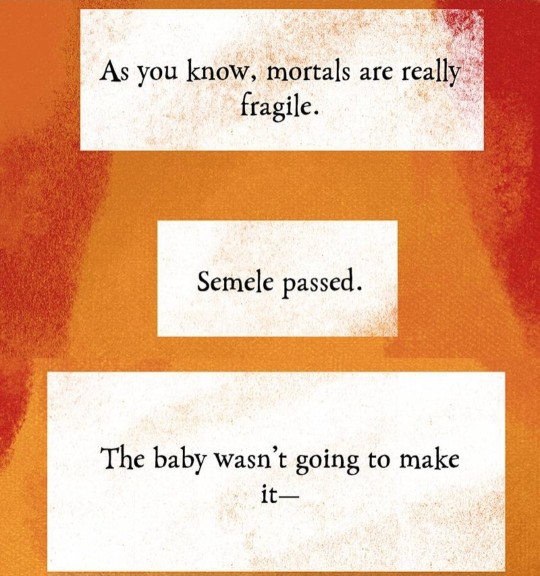
True as it may be that mortals are fragile and, yeah, mortal, I'm calling bullshit on part of this.
In the original myth, Hera knew about Semele being pregnant. The Queen of the gods disguised herself as an old woman and convinced her dumbass husband to appear before Semele in his true form. Since mortals aren't meant to see that, Semele pretty much EVAPORATED on the spot.
If we recall, Zeus isn't the most honest god on Olympus. FFS, more like the LEAST honest. Remember that bullshit he fed Demeter about Hera marrying him being Hades' idea? Forever reigns the lies and bullshit....

Speaking of Semele, she looks lovely here. Pity we didn't get to see much more of her.
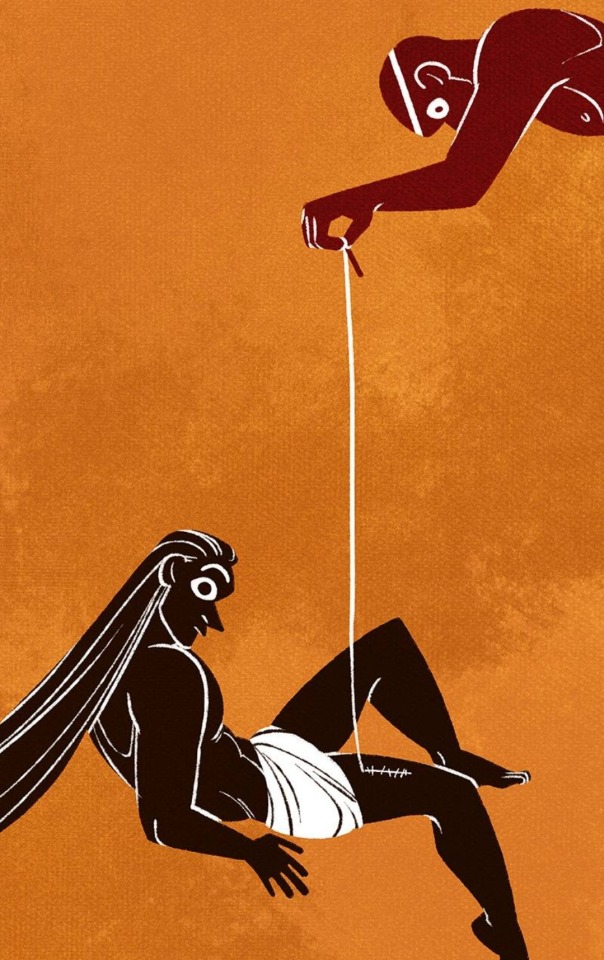
Appreciate the pottery-style art here. Those stitches make his leg look like a football, though.
Which also leads me to another point -- besides the stitches, what other proof was there of pregnancy? Real world women get round and swollen during pregnancy. I didn't see Zeus walking around with a fat thigh. Did you?
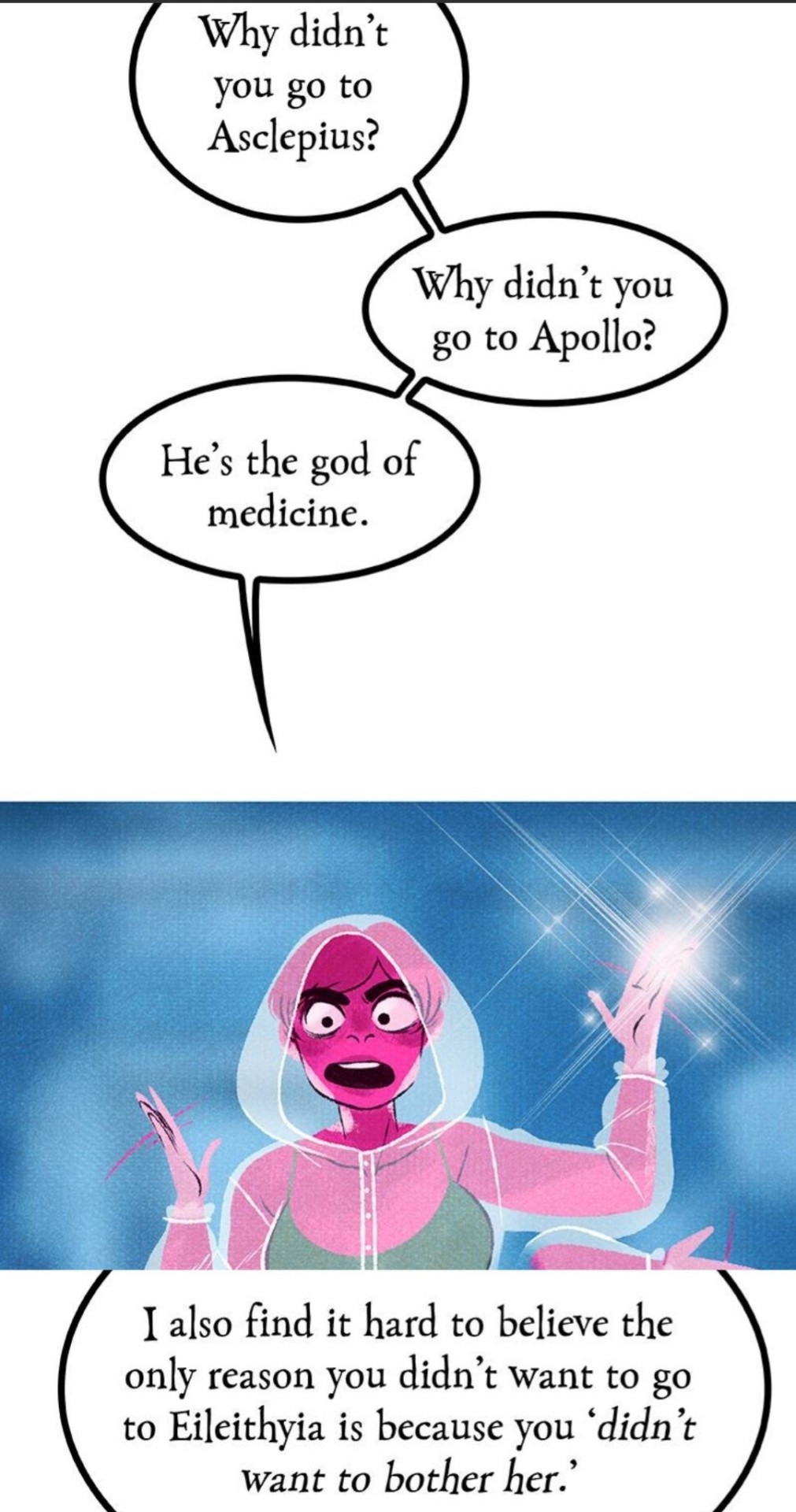
For all of these legitimate, important questions, all of Zeus' answers come back to "I don't want Hera to find out."
Asclepius should already have been aware since, you know, HE SEWED THE KID TO ZEUS' THIGH. Besides a threat from Zeus, what else was there to stop him leaking the secret to anyone?
Apollo was just a bad idea all around. He already tried to marry and SA'd Persephone to get at her fertility goddesses powers. Zeus is onto him, so getting him involved is a big, fat NO.
Eileithyia might have ratted Zeus out anyway. Unless I'm mistaken, she HAS to be present for a birth to occur. Her being the goddess of childbirth means she WAS present in some way for this. Before Artemis & Apollo were born, she was actively delayed and prevented from going to Leto.
Or was that another childbirth goddess that I forgot the name of?

Persephone seeing the similarity between Dionysos and baby Hades likely triggered her. She literally jumped from the dream dive to this, so what she saw is still very fresh in her mind.
Also, baby Hades in the last pic, despite looking anxious, is CUTE!

Zeus.... that face.... I fucking CAN'T!
(He deserves all the pain he's about to go through.)
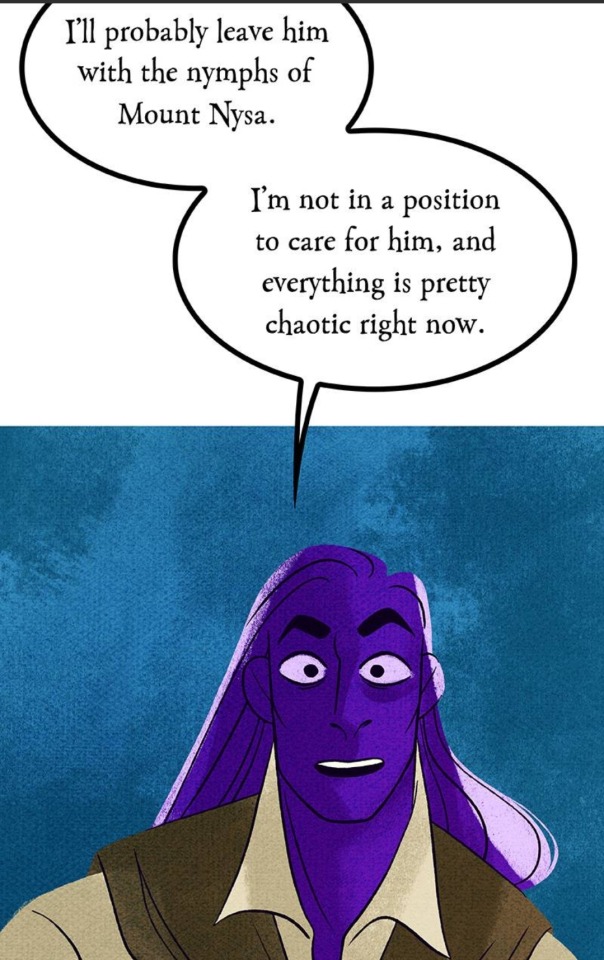
Typical Zeus, dumping off his demigod progeny with someone else to be THEIR problem instead of his.
Refresh my memory--- is that the same place/nymphs that raised Zeus after his mom fed Chronos a rock? If so, I guess I can see why that'd be his plan, but that's still a shitty thing to do!
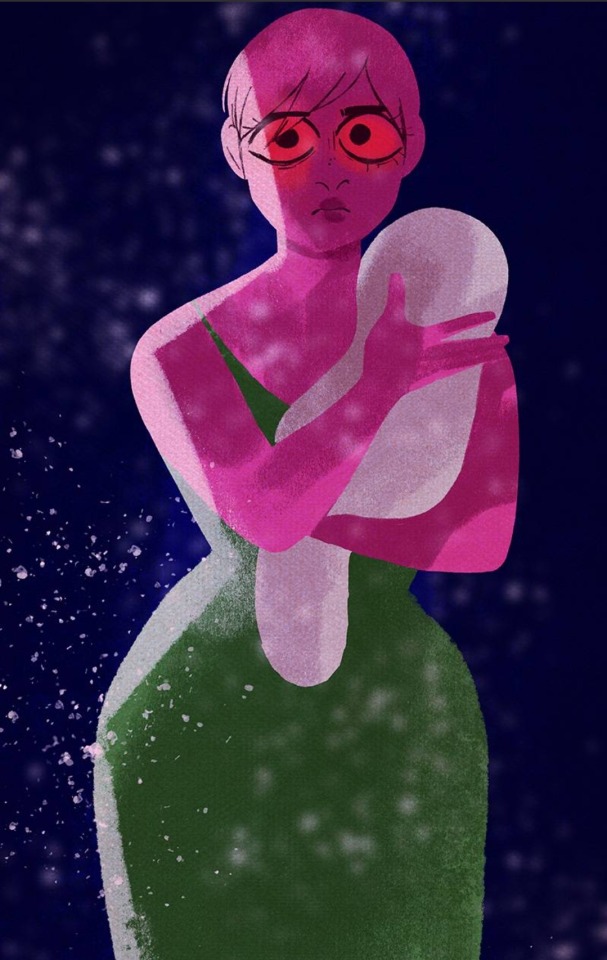
...aaaannndddd Persephone goes into "Fuck you, he's my kid now!" mode.
Going back to what I wrote about the previous episode, if Persephone & Hades do adopt him, it might be Rachel's way of making the Dionysos/Zageus link stronger. Also, consider that Dionysos was "born" in the Underworld, and the goddess of childbirth was not present. That could be part of the stillborn origin of Dionysos/Zagreus.
Anyways, thanks for coming to my LO post!
44 notes
·
View notes
Note
I know you’re not exactly Dionysos’ biggest fan but I always enjoy when his mother Semele/Thyone appears in your fics. Do you have any headcanons/ideas on what her immortalized life is like? What gods besides her son does she get along with, and what’s her relationship with Zeus and Hera now?
Thank you!
I use a line from one of Pindar's Odes where Thyone's noted to be close to/loved by Athena, so Athena is one of them Thyone gets along with/has a close relationship with! And possibly Chariclo (the nymph mother of Tiresias, which Callimachus notes in the Bath of Pallas as being very close to Athena), unless they have a bit of a rival situation for Athena's attention fdbhjdffd. Then her sister(s) too, and of course her/their parents when they get to Olympos.
(That is just my own invention, the closest Kadmos and Harmonia gets to that after at some point being restored from being snakes is going to Elysium, but why would Aphrodite and Ares want to have their daughter, who is presumably at least a goddess-nymph, that inaccessible to them??)
Undoubtedly she gets along with Ariadne as well (see no reason why they wouldn't!) I think it would be sweet if she gets close to Ares? He is her grandfather, after all. Aphrodite is another possibility, but since Thyone is close to Athena maybe she's got a more distantly polite relationship with Aphrodite because of that.
Given that we have literally nothing about Thyone's post-apotheosis life in regards to Zeus (or Hera), I do kind of headcanon that while Zeus is still fond of her, her death caused an emotional injury that even the resurrection doesn't heal. On her side, maybe the death and her time in the Underworld also caused a distance to certain parts of her first life that it's easier, no matter how much she was attracted to him at the time and they probably were building a more intimate relationship than usually happens, Thyone is fine with leaving that in the past.
They have a cordial enough relationship, I think, but nothing that really echoes their months-long one during her pregnancy. Maybe they eventually develop something that's a new facet of it, but only in terms of being friendly companions instead of with sexual and romantic dimensions.
For Hera... if Thyone forgives her for what she did to her, it'd probably be quite a bit down the road. Hera has little reason to do anything further, especially when Zeus and Thyone end up having no closer relationship and nothing as before Semele died. But she probably isn't really friendly with her, either. Chilly politeness on both their sides, undoubtedly!
8 notes
·
View notes
Note
How do you view relationship and dynamic between Hera and Dionysus after the Hephaestus throne incident? Do you think they reconcile and bury the hatchet or is there still animosity? Do you know of any evidence of how their relationship was treated in ancient worship? Sorry for a barrage of questions, I’m just curious about the relationship between these two gods given how connected she seems to be in most versions of his origin story.
They definitely reconcile. In one account Hera is even the one who convinces the other gods to accept him as a fellow god (X) and there was a tradition according to which the women of Naxos give birth before 9 months as a gift from Hera after her reconciliation with Dionysos,. There is a reference in the Palatine Anthology to Hera saying that she has more of a claim over Dionysos than his mother does, and in the Dionysiaca she breastfeeds him (as an adult, I must add 😬 though Zeus kinda forces her into it) and thinks that she would like him as a husband for Hebe.
But do they ever become particularly close or grow to actually like each other as people? Not sure. I tend to think not. They are on decent terms probably, but while we have a Hesiodic fragment claiming that Hera loves and honors Herakles second only to Zeus and a play by Sophokles where Herakles calls Hera the noblest of mothers, + an account of Hera literally adopting him and a reference to a hymn that called Herakles the son of Zeus and Hera, nothing similar really exists about Hera and Dionysos as far as I know.
As for their relationship in cult, it seems to have differed from place to place. On Lesbos, Hera, Zeus and Dionysos were worshipped together and at Olympia the same sixteen women who organized the games in honor of Hera and wove a robe for her also arranged a choral dance for a lover of Dionysos named Physcoa. On the other hand, Plutarch says the following about their cults in Athens:
„For instance, not to digress far from our present subjects, they do not suppose nor admit any intercourse between Hera and Dionysus; and they guard against combining their worship; and their priestesses at Athens, they say, do not speak to each other when they meet, nor is ivy ever brought into the precincts of Hera, not because of their fabulous and nonsensical jealousies, but because the goddess presides over marriage and bridal processions, and drunkenness is unbecoming to bridegrooms, and most unbefitting to a marriage feast …”
12 notes
·
View notes
Text
Howdy! I am thinking of coming back to this blog because I feel like it was important to me. Will be using it at least for a little while.
About me:
26
Transmasc/nonbinary/genderfluid-ish/bigender-ish
White
Primarily worships the Theoi (Hellenic, or Greek, gods), with a few additions
I am not a reconstructionist. I take my religion seriously, but I take my cue from the gods, not internet randos or even tradition 🤷🏻♀️ I've have never had an issue when approaching the gods without having washed my hands or face (and I generally forget, even when I did decide to incorporate it into my practice) or such like that. I do follow guidelines for core things, like not offering blood, etc. But I play pretty fast and loose with the rules, so you've have come to the wrong place if you are looking for a resource on reconstructionism. If you harass me about not adhering strictly to tradition and ritual structure, I will block you.
I worship the gods, not work with them. I am not a witch at all! I occasionally do divination (which is not witchcraft) but that is it!
Gods I Worship:
Main:
Dionysos
Hermes
Aristaios
.
Occasional:
Aphrodite
Ares
Zeus
Set
Lugh
Persephone
Lucifer
.
Interested In:
Hephaistos
Artemis
Skadi
Khione
Jesus (in combination with Dionysus, specifically)
Hera
Agathos Daimon (household spirit)
Freyr
Inanna
Loki
Nut
Ra
Geb
Sobek-Ra
Anubis?
I'm am for sure forgetting someone, but brainfart lol
Some Personal Views:
Fuck terfs! The gods love trans people!
Fuck nazis, fuck white nationalists, fuck folkists! Hatred has no place in this community.
Fuck mythic literalism. Please pick up a book and stop lying about Persephone and Aphrodite hating each other. The Theoi don't have irl beef, you can worship any of them with each other—they are a *family.* Additionally, gods were often worshipped together *because* of their beef in the mythos. Persephone and Aphrodite, Athena and Poseidon, Athena was given Pallas' name as an epithet even though she killed her (though they were admittedly friends/adoptive sisters)
The gods aren't going to smite you. This is mainly from a hellenic perspective because I'm am most educated about it. If you don't give an offering in a long time or something similar, you don't have to grovel and beg for forgiveness or offer an extravagant gift. Just give them an offering, talk to em/them, and don't worry about it. Kharis can always be reestablished. An exception to this would maybe be if you broke an oath to a god. THEN asking for forgiveness and giving a nice offering would be appropriate. But they won't kill you or anything. People've who've have done this have mentioned that the blessings gifted to them by the gods were simply revoked, maybe added some additional misfortune. Which is pretty easily rectified, from what I understand. You can make amends. The gods are deeply accepting, understanding, and forgiving. They are not human. We don't live in a myth, and you do not need to fear any real harm from them (*especially* physical)
Related to the above, you cannot offend the gods on accident. If you learn later that you did something that they would rather you not do (in relation to your interactions with them), that's okay! You can do better now, the gods won't hold it against you if you didn't know ^-^ Now if you INTENTIONALLY try to piss them off, disrespect them to spite them in a fit of anger, then it is apology time.
Finally, no DNI. Just don't be an asshole and we're golden.
#pagan#hellenic paganism#hellenic polytheism#paganism#hellenic pagan#educational#sort of#polytheism#eclectic pagan#eclectic paganism#hellenic gods#hellenic deities#greek gods#greek deities#theoi#theoi worship#hellenism#hellenismos
13 notes
·
View notes
Text
Mycogenous – a book exploring Dionysos in the fungal realm
This isn't my book. This is Dver's book. And it is something she has been working on for some time as part of her devotion to Dionysos.
"Dionysos has always come first for me – I discovered Him before I was even properly pagan, and He was the first god I came to when I started studying polytheist traditions, and has remained by far the most important god to me, sometimes almost to the point of henotheism. I think of myself as a Dionysian as much as anything; He is at the core of who I am. And yet, all these years, everything I’ve written, and only now have I finally created a book entirely dedicated to Him. Only now do I feel I have something to say, to share, to offer those looking to connect with Him. Something very special to me."
This is a different Dionysos than most people encounter. This is not the Dionysos of the revelry, of the enthused intoxication, of the excess of movement and sound and action.
"For this Dionysos is not the familiar god of the wild animal, or the verdant vine, but rather a fungal god – not just symbolically but literally. He is the Dionysos that brings life out of death, that dissolves boundaries, that opens doors, that effects transformation…all through the varied manifestations of the fungal kingdom. And no, I am not just referring to mushrooms (mind-altering or otherwise), although they are part of it. I’m also talking about the kind of fungus that rots the dead, the kind that intertwines with trees, the kind that turns grapes into wine, the kind that heals, the kind that destroys, the kind that spreads and changes everything it touches.
I have taken to calling Him by the title Mycogenous Dionysos."
This is not a history book. Not an art book. Not a text book of spells and rituals. This is a devotional.
"In this book, I use a combination of prose, poetic allusion, and visual art to convey something of what I have experienced and learned, in hopes of helping the mycelium of Mycogenous Dionysos to spread. I don’t know who, if anyone, will feel called to this path, or resonate with it, or be taken wholly by it as I have, but I know I need to put it out there. I need to release the spores; it is not up to me where they land."
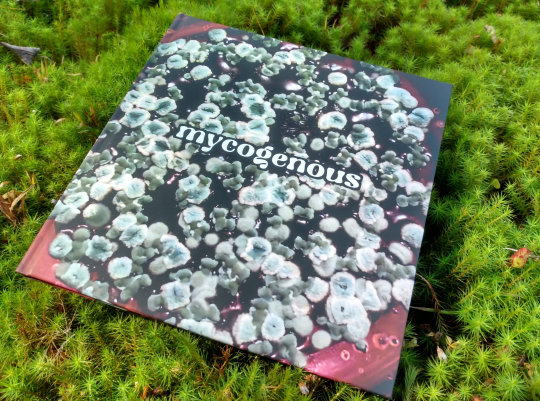
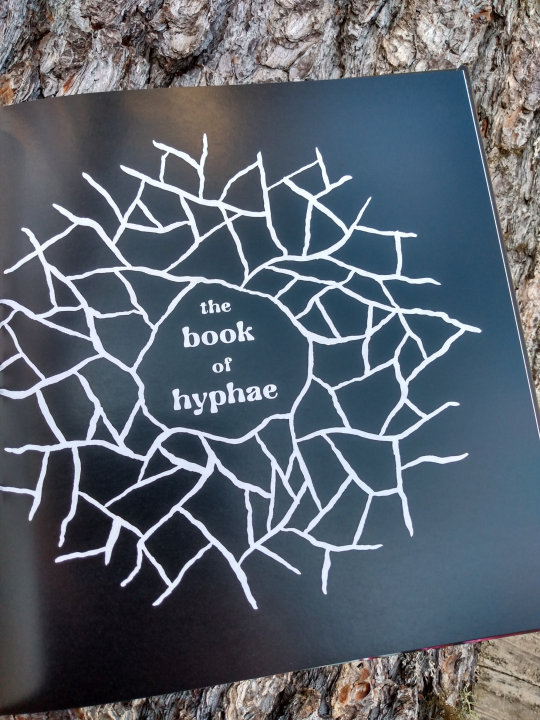
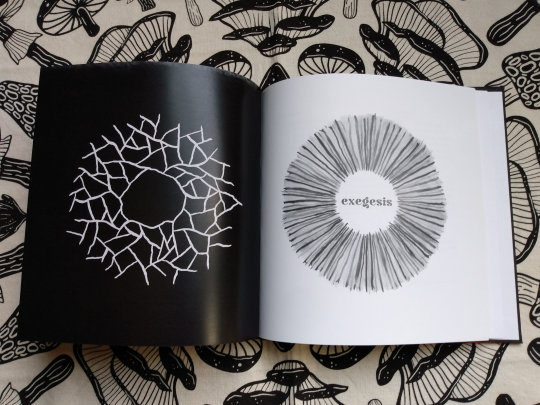
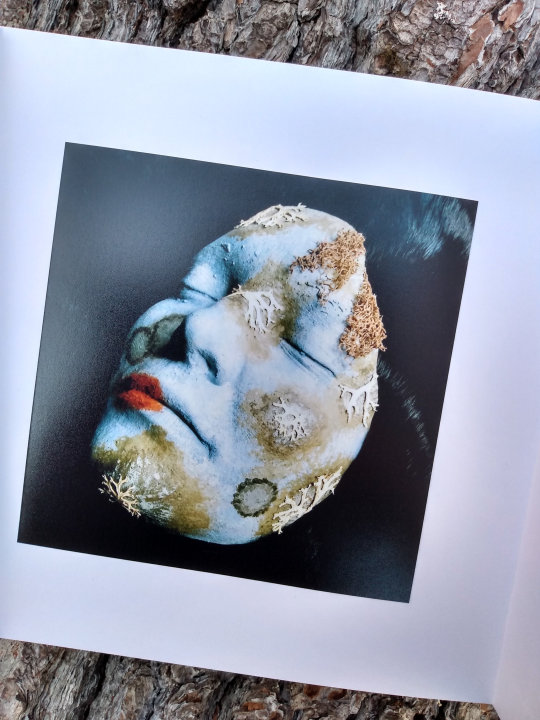
Mycogenous
7.5×7.5 inches, 82 pages, 80# semi-gloss paper, matte casewrap hardcover
"Incorporates reproductions of several original ink and brush illustrations created for this project, as well as three tipped-in color plates of masks I made several years ago as I began delving further into this path."
Available only in Dver's Etsy shop
As always, I would appreciate any help spreading the word about this, as I do not have social media or any other way to communicate beyond this blog and my shop. While I wrote this for polytheists and especially for Dionysians, I do wonder how it might resonate with those unfamiliar with the god but drawn to fungi or spiritually connected to nature, so please feel free to disseminate beyond the pagan world.
If you would like to encounter more about Dver, her devotional practices and offerings, and her other works, her blog can be found at https://forestdoor.wordpress.com/
#Dver#Dionysos#fungus#mold#devotion#pagan#book#Mycogenous#If you know someone this would interest please share this post.#Dver does not do the socials.
17 notes
·
View notes
Note
OK so for Mythology. The way I'm thinking of this is that they are Proto-Indo-European gods whose roles overlap with Greek mythological counterparts, but I'm also mixing in some Roman, Norse, and Celtic deities. So it's not so much "Mo'at is Gaia" as "Mo'at is a mythological figure LIKE Gaia."
The Omaticaya would be forest and earth deities. Mo'at would be the Earth Mother, like the Earth Primordial Gaia. Eytukan would therefore be her opposite, the Sky Ouranos that was made by Gaia. Their daughter, Neytiri, would be the Dawn Goddess, like Eos, most fair of all their children and born of the union of light between Sky and Earth. Sylwanin was the goddess of wild forests before she was killed (we'll get to who in a minute). Tsu'tey, then, is a War God, but in the sense of society and defense, like Athena or Mars.
In this AU I'm operating under 'the recoms and humans all exist at the same time.' Grace Augustine was a human who has received so much love and devotion that she had an apotheosis and became a goddess (like Psykhe or Dionysos), but her nature as Former Human means she is not on the same level of divinity as the other gods and can be killed. As the goddess of knowledge, and seeing how vulnerable knowledge has become in this world consumed by human greed, she created the "Avatars" or humans she elevates to divine status to help her protect knowledge and gain more. This makes the 'Avatars' gods like her, but also gods without patronage that act solely as enforcers of her will, like Valkyries.
Quaritch and the Recoms are deities that rebelled from Grace's control. They used her divine gifts to co-opt a new source of divinity, Unobtanium, so they can exist with divine power but without her ability to take that gift away. They resented the control Grace had and the limits that the Omaticaya enforced, and seek to become gods in their own right.
Jake is a Trickster God, a mix of Loki and Prometheus. Originally, Tommy was going to be one of Grace's deities, but upon his death the divinity settled onto Jake by accident. His divinity, and existence outside of Grace's will, made him a curiosity to the Gods of the (Home)Tree of Life, and they invited him to reside there to learn both about him and the way of true divinity. He initially was secretly working with Quaritch, seduced by Quaritch's promise of freedom, but his love of the goddess Neytiri and his realization of how the Recoms were destroying the balance of the world convinced him to truly join the Omaticaya. Still, when the Recoms attacked the Tree of Life (think the battle between the Olympians and the Titans) Grace and the Omaticaya were so disgusted by his treachery that they severed his connection to the divine. However, Jake uses his wits to trick the Great Leonopteryx into giving him a portion of its power, making him a true god on the level of Neytiri and the other Omaticaya.
The final battle happens, and most of the Recoms are slain, and Quaritch almost severs Jake's connection to the Divinity of the Leonopteryx, but Neytiri saves him and Quaritch flees into the world. It is only after this that Jake is granted true divinity by Eywa and becomes the patron god of tricksters.
I'll get to ATWOW in a bit. People are calling me
Tonowari and Ronal would be ancient water primordials, who lived before gods or titans, like Oceanus and Tethys.
I love and I love your brain, wow. Mo’at and Eytukan as the earth and sky is SO good, Grace as an ascended human who’s created the Avatars is unbelievable— the story and the way you’ve connected all the canon events into comprehensive parallels to GODS??? I’m in awe
You need to expand on this, I would eat up every single word. Literally still speechless at Grace and the avatars that’s so good, I love it so much and Jake’s trickery and wit being the reason that he’s both severed from divinity and gifted godhood DAMN DUDE
You are wonderful and I am patiently waiting for more
#avatar 2#avatar the way of water#jake sully#neytiri#grace augustine#avatar au: gods#I am on the ground eating dirt this is so so good#spicy’s asks
19 notes
·
View notes
Note
How was Dionysus in the retelling?...
Like he was really romantic and sweet in Ariadne how different was their relationship in the book?
i’m not sure i quite understand? do you mean how accurate he was to mythology?? if so…
i feel pretty neutral about dionysos in the book. he’s definitely not like how i envision him (starting with the blonde hair lmao) but that’s more of a subjective thing than anything else. personally i would’ve wished for him to be a lot crazier, a bit more god of wine. ariadne feels like a pretty unreliable narrator to me so a lot of this comes down to what she describes him as, but i also didn’t like the fact that he’s supposedly so different from the other gods (even if that does get disputed towards the end). he really is no different, he is literally a god.
#idk i can’t pinpoint exactly what it is#and again idk if this is what you’re asking for (if not i’m sorry!!)#anon#asks#greek mythology#greek myth#dionysos
9 notes
·
View notes
Text
Green spring: The Wiccan deities
THE WICCAN DEITIES
Category: Wicca
Wicca is without a doubt the first name that pops up when people speak of things such as “neo-paganism”, “new religion of the 20th century” or “modern witchcraft”. Wicca however is actually a very broad and large term that covers as much a religious movement as a school of esoteric and occultism, mixing a lot of different influences both ancient and modern, and just like any religion it covers a wide set of different branches, sects, interpretations and sub-types of “Wicca practice”. There are many different forms of “Wicca”, but they all at least agree on one point: there is a duo of deities that is at the central of the Wicca worship.
I) The divine couple
Wicca started out as a duotheistic religion, centered around two deities: the Goddess and the God, also known as the Lady and the Lord. I say “started out” because, as said previously, Wicca is a true religion with many different conflicting branches and traditions. Almost all of them however have this duotheistic focus on the Lord and the Lady – however it can range from a theist point of view worshipping the divine couple as literal gods, existing powers in the world ; to more atheist interpretations that rather interpret the God and the Goddess as symbols and archetypes, not as actual beings.
However a certain branch of Wicca (which with time seems to have grown in size, presence and influence) rejects a pure duotheism to rather embrace a form of henotheism – a refusal to deny or refute the existence of other deities. This form of Wicca decides to “include” or at least make “contact” with other mythologies and religions by considering that all the goddesses are actually just facets, aspects or incarnations of the Wiccan Goddess, the same way that all gods are just alternate names and identities of the Wiccan God. As a result you will have numerous Wiccans who consider that Kali from Hinduism, Eostre from Germanic mythology and the Catholic Virgin Mary are just different faces of their Goddess ; and others who will explain to you how and why Dionysos of the Greek myths, Cernunnos of the Celtic religion and the Judeo-christian Yahweh are all one and same God. Gardner himself (see below) compared the two to the duo of Isis and Osiris in Egyptian mythology. This is notably why the Wiccans adopted the denomination “Great God” and “Great Goddess”, to differentiate their deities from the “smaller” or “lesser “deities, which are just fragments of the “great” ones – others prefer the term “Universal Goddess” and “Universal God”.
There is also an actual current of polytheism among the Wicca branches, a small category of Wiccans deciding that yes, the other “lesser” gods do actually exist, even though they are all just “under” the main two deities – or all born/manifested out of the divine couple. This can even range into a fully animistic views, but that’s another topic.
The God and the Goddess embody a fundamental dualism: he is the masculinity, the force and the sun, where she is the femininity, the form and the moon. Their interactions are what made the world, nature is born out of the balance between them, and to understand the universe one must understand their union. The deities are manifested in the Wiccan religion by a High Priest and a High Priestess.
A last important part of the Wicca belief is the idea of the “manifestation” of the deities. Wiccans believe that the God and the Goddess, be them actual deities or psychological archetypes, can actually “manifest” to people in various ways – and while some believe in actual physical manifestations, others rather believe more in manifestations through dreams, or through the possession of Wiccan priesthood.
II) The Great Goddess
When it comes to the Wiccan deities, the most common name/appearance/characterization of the Wiccan goddess is “The Triple Goddess”. However it wasn’t how she started out…
You see, Wicca was formed and influenced in its early days by many early 20th century/late 19th century researches about prehistorical religion, and the “truth” behind the “witch-cults” of Europe. And the thoughts of people such as Margaret Murray or Gerald Gardner was that in the Stone Age, people worshipped a primordial duo of deities known as the Horned God and the Mother Goddess – a simple worship that was replaced by the most complex ones of Antiquity, but that still survived in Europe under rural cults that were considered to be “witches” by the Christian church and persecuted as such. It was these “primordial deities”, considered to be the “tribal deities of the British Isles”, that Wicca tried to re-include, rehabilitate and restore in their religion, and so the Goddess original form was the one of the Mother Goddess, a deity of life and fertility with a particular focus on springtime, an “ideal of feminity” who was the goddess of the “gatherers” of the hunter-gathered duo of the Stone Age, and the feminine power worshipped by “witches”. Gerald Gardner, who was the man that established the Wiccan core tradition and made the movement public in the 50s, claimed that the true names of the deities had to be kept secret – before an “leak” revealed that the rites of the Gardnerian tradition worshipped the goddess under the name “Aradia”. This promptly led the name of the deities to be changed, in order to keep the secret. According to Gardnerian Wicca, the Mother Goddess, also called the Great Mother, is the one who offers love to the living, and regeneration/rebirth to the dead – she is simultaneously the Eternal Virgin and the Primordial Enchantress, and she is connected to the moon, the stars and the sea. In other mythologies and religions she is known as Brigit, Hecate, Diana or Gaea, and she is said to “conceive and contain” all life within her – which is why Wiccans held life itself to be sacred, and consider all living beings to be divine. As a Moon goddess, she is also considered to be the goddess of menstruation.
However, this original characterization of the “Mother Goddess” promptly got fused/replaced by another “identity” that is the most famous one today: the identity of the Triple Goddess. A goddess that manifests as a trinity identified as Maiden, the Mother and the Crone, representing respectively virginity, fertility and wisdom (though the Gardnerian influence still kept the “Mother” facet the most important and prominent of the three). On top of representing the three “ages” of the “female life”, the three “faces” of this Goddess also represents the three aspects of the Moon: the Maiden is the waxing moon, the Mother is the full moon and the Crone is the waning moon. This triple nature also allows the Goddess to rule over the three realms of the world: heavens, earth and the underworld. Through the three processes of sexuality, pregnancy and breastfeeding the women “embody” the Goddess or make their own bodies sacred to her. The Triple Goddess is a force of change and a symbol of self-transformation. The Maiden embodies birth and youth, enchantment and beginnings, inception and expansion ; the Mother is sexuality and stability, power and life, ripeness and fulfilment; as for the Crone, she is repose, death and endings.
The concept of the Triple Goddess doesn’t actually originates from Wicca, but from other writings of the early 20th century. Most notorious and influential of them being Robert Graves’ works, his two books “The White Goddess” and “The Greek Myths”, which proposed a personal and “poetic” re-reading and re-interpretation of the Greek myths, in the light/in comparison with Celtic myths, leading notably to the creation of a reconstructed divine figure, the “Triple Goddess”. This poetic and literary theory was taken back by other figures of myth studies and comparative mythology, such as Jane Ellen Harrison, Marija Gimbutas or Karl Kerenyi, defending the concept of a Triple Moon Goddess worshipped by early European cultures and that manifested the most clearly in Greek mythology. Indeed most of the “manifestations” and “proofs” of the Triple Goddess come from Greek mythology: the Charites (Graces), the Horae (Seasons), the Moirai (Fates), the goddess Hecate (a triple-deity), the trinity of Demeter/Persephone/Hecate, but also a local cult of Hera as “Girl, Adult woman and Widow”… Though the construction of the Triple Goddess also included non-Greek elements, such as the Hindu Tridevi. Of course this was a very controversial take and idea, that based itself primarily on poetic systems and literary evidence while being contested by more cultural/historical/archeological elements, but it was nonetheless a concept popular and influential enough to reach both Carl Jung (who made it one of his famous “Jungian archetypes”) and the Wiccans.
III) The Great God
As said above, according to the theory of the “Stone Age duo”, the Wiccan Lord was (and is still) most widely and commonly interpreted as the Horned God, worshipped by the hunters of the hunter-gatherer duo, and who was the so called “dark goat/devil” worshipped by the cults persecuted during the witch trials. And unlike the Mother Goddess, who got replaced by the Triple Goddess, the Horned God stuck around and didn’t change much.
He is the perfect complement of the Mother Goddess: he is the god of nature and death, an “ideal of masculinity” with a particular focus on animals. He is the Garnerian god of hunting and magic, connected to the sun and the forests, who rules over the paradise known as the “Summerlands”. He is a force of sexuality, wilderness and life cycles who is usually depicted as a man with horns or antlers, embodying the “union of the animal and the divine” and carrying the souls of the dead away from the world of the living.
The Horned God’s correspondence in other pantheons include Cernunnos (Gaul), Lugh (Irish), Herne the Hunter (English), Pan (Greek), Faunus (Roman), Brân (Welsh), Wayland the Smith (Germanic), Tubal-cain (Biblical) and Pashupati (Indian). In fact, Cernunnos was the initial “secret name” of the Lord, just like “Aradia” was for the Lady, before its public revelation led to the keepers of the Gardnerian tradition to change his secret appellation. Other used and known name for the God are mostly deformations of “Cernunnos”: Kernunno, Janicot, Karnayna, Atho… The Horned God is also recognized by Wiccans as being the Leader of the Wild Hunt (often said to take place at Imbolc, 1st of February), which he leads as the “Lord of Death and Resurrection”.
The most common consideration among Wiccans is that where the Goddess is triple, the God is double: he has a “dark” and a “bright” faces representing the duality of nature – night and day, summer and winter. Alongside the three faces of the Goddess, the two faces of the God makes the Wiccan Pentagram, and Wiccans associate it with the folkloric figures known as The Holly King and the Oak King, male seasonal embodiments said to each rule over a different part of the year (the hot and sunny part of the Oak King, the cold and dark part for the Holly King). A lesser tradition rather considers that the God should be equal to the Goddess and thus have also three faces representing the “ages” of a man’s life – these Wiccans worship the God as the Youth (or the Warrior), the Father and the Sage.
The Lord is at the same time the lover and the child of the Goddess, the “spark of life and inspiration” within her (which is why alternate titles and identities to “The Horned God” are “The Son God”, “The Lover God” or the “Divine Child”, associated with the worship of the Christ Child). It is said that the Lord follows a seasonal life centered around the Goddess, according to the series of festivals and holidays known by the Wiccans as “The Wheel of the Year”. The Lord is born in winter out of the Goddess, grows in spring, becomes the lover of the Goddess in summer, and after impregnating her dies in autumn, before being reborn the next winter. That being said, the exact dates of each of the God’s life-events are up to debate: for example Wiccans debate whether the God dies on Lammas (August 1st), on Mabon (the autumn equinox) or in Samhain (October 31st).
A last debate about the God is about the… let’s say “alternate identities”. You see, the idea of the God/the Lord being identified as the Horned God isn’t favored by all. Some Wiccans will drop other names. The Divine Child or the Sacrificial God have been talked about before, but two identities notably stood out from the others: The Vegetation God, tied to the Oak King/Holly King duality and representing a Wiccan appropriation of the Green Man figure; and the Sun God, considered to the at the center of the Wiccan holiday of Lughnasadh/Lammas. And while some people consider these identities to be just alternate names/faces of the Horned God (who is associated with the sun and the forests), others argue that these might be distinct deities… And this range from people talking of them as separate male gods existing alongside the Horned God, to either the Green Man or the Sun God being actually the “true” Lord/Great God, not the Horned God. But usually, it results in the three figures being mixed together (it isn’t uncommon to see Wiccan imagery have a Green Man with antlers or a Horned God crowned with sunrays).
- - - - - -
While I said the Wiccan religion became more and more polytheistic as time went on, another side of the Wiccan religion also became more and more monotheistic as time went on. This is notably due to one of Gardner’s original stance, which made the Wiccan religion slightly agnostic: he was certain that beyond the two Wiccan deities existed a Supreme Deity, or Prime Mover, which was too complex for humans to understand. Gardner claimed it was a divinity in a purely deistic form, and that had created the “Under-Gods”, such as the Lady and the Lord, but who hadn’t done anything to the world (isn’t ruling it, didn’t create it, just created the “Under-Gods”).
This interpretation was also popularized among Wiccans under a more pantheistic perception, some claiming that the God and the Goddess were actually the two faces of one same being, the same way all the “lesser gods” were just aspects of the Lord and the Lady, making it so that all the gods and goddesses are one deity ; other rather invoking “The One” as being more of a great impersonal force from which the Lord and the Lady manifested.
Now, Gardner deeply hated and criticized monotheism (he notably invoked the “problem of evil” as one of the biggest ways to break down monotheistic religions), and yet in the 60s and 70s a strong monotheistic current formed itself among Wiccans. A monotheism focused over the Goddess, and rejecting the existence of the Lord or any “supreme entity” beyond the Lady. To talk about a precise example, the most commonly accused is the “Dianic Wicca” branch, a group of Wiccans who formed in the 70s as an all-female cult, centered entirely around feminine experience and female power, and who only considers one Goddess and no other deity (this branch is heavily influenced by the book “Aradia, or the Gospel of Witches” and keeps its traditions that the “witches” of Europe were part of an all-female cult and secret matriarchal society worshipping a goddess who was at the same time Aradia, Diana, Aphrodite and Herodias). Dianic Wiccans are very different from “traditional” Wiccans, and in fact many of the “traditional” Wiccans actively criticized and rejected the Dianic Wiccans by accusing them of merely being “Christianity reversed”, replacing all the “Him” and “His” by “Her” and “Hers”.
But the Dianic Wicca itself is actually part of a much wider movement of neo-paganism of the second half of the 20th century commonly referred today as the “Goddess movement”, a huge wave of different Neopaganism cults, beliefs and philosophies that rejected dominant masculinity and the patriarchal mindset.
As a departing thought: while the idea of the Triple Goddess as “Maiden/Mother/Crone” as adopted and popularized by Wiccans is the iconic iteration of this trinity, in the books that started it all, Robert Graves’ books, the identities of the Triple Goddess as much less clear cut… As I said before, these books proposed a “poetic” reinterpretation and reading of the Greco-Celtic myths, Graves himself being a poet. He firmly opposed the “scholarly” readings and analysis of the myths, claiming them to be too much “prose”, and rather wanted to return to the “poetry” of the Greek texts… But poetry being poetry, Graves never had anything set in stone. He laid out three different “trinities” that could represent the Triple Goddess. One is the iconic Maiden/Mother/Crone, but another focused on the woman’s sexuality towards the man is “Maiden/Nymph/Hag”, and a third one centered around the role of a woman in a man’s life is “Mother/Bride/Layer-out”. He also evoked the moon goddess as manifesting through the Maiden (New Moon), Nymph (Full Moon) and Mother (Old Moon)… He even complexified the system as a “three-in-three” deity at some points, claiming that the Goddess manifested as the goddess of the underworld, the goddess of the earth and the goddess of the heavens, each with its own three sub-faces: the goddess of the heavens is the New, Full and Waning moon ; the goddess of the earth is Spring, Summer and Winter ; the goddess of the underworld is Birth, Procreation and Death. I mention that because many non-Wiccan neo-pagans grew dissatisfied with the idea of the Triple Goddess, thinking the Maiden/Mother/Crone concept to be stereotypical, reductive or even offensive, and returning to Graves’ books and writings to find more suitable “aspects” or “faces” of the Goddess.
16 notes
·
View notes
Text
Okay I watched the first two episodes of the new PJO show and I have some opinions!!! So please don't read if you haven't seen it already or read the books!
1) "Annabeth is supposed to be white and blonde" "why doesn't Percy have black hair" shut up. Everybody shut up. Can we talk about the fact that they actually managed to cast KIDS? Not 18 year olds who look like they might start university any minute, but 14 year olds who actually LOOK like the age they're portraying? This is such a huge deal for me, because it also makes the terrors of being a half blood so much more real, bc it's KIDS having to fight monsters and losing their loved ones and struggling with being bullied and punished for not fitting in the normal world. So this is an A+ choice for me.
2) I LOVE the way they included Sally in the storyline. They didn't cut down from her parts in the book AT ALL and I'm so so so happy she got a decent amount of screen time and a proper charactarization. This was one of my bigger worries; that they might try to reduce her introduction to cut more screen time for the magic stuff and the camp. But I'm glad they showed her relationship with Percy in a little more depth bc I think it is/will be one of the biggest motivators for Percy throughout the whole story.
3) Gabe could have been WORSE. Yes, he's an insufferable dick but I was looking forward to his comically evil friends playing poker and trashing the living room. They probably thought it would have been too exaggerated, and I can kind of see that. But still I fucking giggled at his "who the hell is Yancy".
4) Jason Mantzoukas as Dionysos. That's it. A better casting choice has never been made.
5) My favourite scene so far is the fight between Percy and Mr D regarding the quest. "No, I am Sally Jackson's son" might just be my favourite line ever. I don't remember wether if it was in the book or not, but either way I love that they included it. Percy is tired. He is in pain. In the span of a couple of days, he has fought two giant mythical creatures, has seen his mother die, has been bullied, harassed and thrown into a new world where he literally knows no one and nothing. He doesn't care for some stupid god who ignored him all his life despite being literally almighty but conveniently shows up when he needs Percys help. He cares about his mom.
5a) Followed by "who is Sally Jackson?!" by Mr D is just equally as powerful and really sells the point that the gods couldn't care less about any human's life or wellbeing. They see the "greater picture" and it really makes you feel Percy's frustration with the whole godly world and their disregard for the mortals involved in it. So far, really really strong writing.
That's it for now, maybe I will add some more later but these were the thoughts immediately popping up as I was watching.
4 notes
·
View notes
Note
Harassment time boys,
Tell me something about Greek mythology you love. Could be specific art or a specific story, or a trope or a singular character.
💚
hades best greek god. faithful to his wife. except that one time w minthe. nice to everyone. antagonised for no reason. actually prolly the least evil god. literally lets heracles stroll into the underworld and borrow cerberus bc it was one of his trials. he gives orpheus a chance to get eurydice back. oh how i love hades
oh yeah i also love eurydice and orpheus's story i love it when lovers cant for some reason get their love back its so fun to read
on that topic i must bring up my fav dead couple and that is patrochilles. hell yea go sacrifice yourself in the war so ur bf doesnt have to hell yea patroclus. hell yea go drag dead hector around the town in fury achilles. then go to his father and both start weeping for your dead. hell yea i love tragedy
on the topic of tragedy i must bring up oedipus. god that play is soo funny i cant. like. imagine. marrying your own mother and fucking her multiple times. then finding out shes your mother. she also finds out shes ur mother and she kills herself. you take the pins from her robes and blind yourself. your daughter antigone tries to help you but also gets cast out bc u commited incest. man that play i cant ever get bored of. like what was sophocles thinking.
my favorite demigod to god story is definitely dionysos. getting raised as a girl to hide from hera and that causing him mega gender confusion. like hell yea boy woooo become transgendre lets goooo
8 notes
·
View notes
Text
I was tagged by @multiverse-of-themind @dihardys @adelaidedrubman and @strafethesesinners to take this quiz for some of the usual suspects (plus a bonus Jharon)! Thank you as always, babes!
Tagging: @florbelles @blackreaches @heroofpenamstan @jackiesarch @shallow-gravy @risingsh0t @roofgeese @indorilnerevarine @confidentandgood @teamhawkeye @shellibisshe and anyone else who wants to torment their progeny with godhood.
NIKOLAOS DIAMANTIS // poseidon
you somehow manage to balance perfectly fisherman vibes and i will pursue decades of vengeance for a single slight vibes, so that’s very cool! just keep doing your yoga or whatever it is that keeps you cool. and maybe warn the people in your life that your wrath is legendary and not to be messed with.
RAFAEL ESTRADA // dionysos
you literally invented wine, the theatre, and having cats. unfortunately you also invented madness and maybe sometimes encouraged your followers to tear people apart. well... anyway, you’re one of those mostly chill people who really know how to party. though everyone does very slightly worry about you. but it’s probably fine right?
WESLEY BROOKS // ares
ok i had to really search the myths for some positive ares rep... i did not find any. regardless, you are not some meathead or the embodiment of rage or whatever. you’ve just got your thing, which ok is a little bit to do with war/anger/wrath etc. but so do the rest of these guys. you’re just as good as the rest of them and you have an incredibly hot aura so congrats on that. there’s more to you than some people bother to see. fuck them if they don’t.
JHARON FALLGLADE // hekate (ft. valanthe)
double, double toil and trouble. yeah you don’t really get much facetime in the myths but you’re literally the god of magic and dogs so stay winning. mysterious goth energy. does she really do complete dark rituals or is that just her vibe. no one knows and you’re not telling.
#'so do the rest of these guys' would have been a fine defense#in a world where the collapse didn't happen and he had to answer for his actions#i'm sure that would have gone over great#oc: jharon fallglade#oc: nikolaos diamantis#oc: rafael estrada#oc: wesley brooks#oc tags#tag games
14 notes
·
View notes
Text
OCs as Greek Gods
got tagged a million years ago by @indorilnerevarine, @chuckhansen, and @dihardys to do this uquiz for my clowns, thank you!!! I'm so sorry it took me this long 😭😭😭
not gonna tag anyone since i'm already horribly late oopsie

Artemis
i mean this in the kindest way possible, you give off huge autistic lesbian vibes. oh you're living in the isolated wilderness? hmm. only with women? yes uh huh. if we're following myths as metaphors you have literal trans egg cracking energy so doubly good for you.

Hera
there are a lot of people who really don't like you i'm afraid, it comes with the whole tricking people, turning your husbands' various lovers into creatures (occasionally keeping those creatures captive on islands), making your son murder his family- But that's fine because you don't care what other people think of you. They have no idea what they're talking about, its tough being you. You know what you're doing and that's all that matters. Don't listen to the people trying to keep you down (unless murder is involved and then maybe listen to them).

Dionysos
you literally invented wine, the theatre, and having cats. unfortunately you also invented madness and maybe sometimes encouraged your followers to tear people apart. well... anyway, youre one of those mostly chill people who REALLY know how to party. though everyone does very slightly worry about you. but its probably fine right?

Hecate
double, double toil and trouble. yeah you don't really get much facetime in the myths but you're literally the god of magic and dogs so stay winning. mysterious goth energy, does she really do complete dark rituals or is that just her vibe. no one knows and you're not telling
#oc: lauren gilbert#oc: amelia mason#oc: jamie fell#oc: aminata clarmonte#tagged#did the clowns that have been recently on my mind as always
5 notes
·
View notes